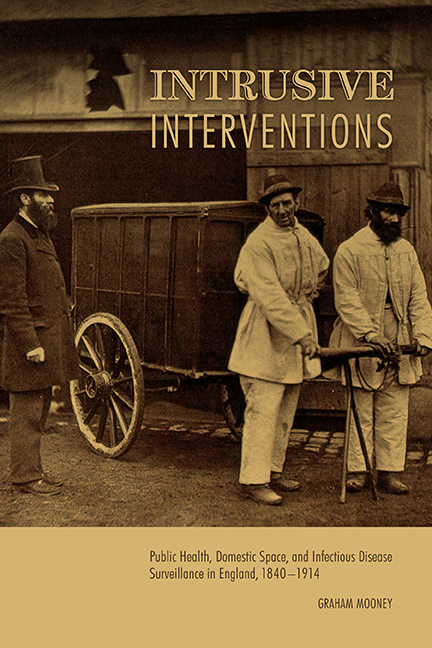 Intrusive Interventions
Intrusive Interventions Book contents
- Frontmatter
- Dedication
- Contents
- Acknowledgments
- Abbreviations
- Introduction
- Part One Making Infectious Disease Surveillance
- Part Two Spaces of Risk and Opportunity
- 3 Sequestration and Permeability: Isolation Hospitals
- 4 “Combustible Material”: Classrooms, Contact Tracing, and Following-Up
- 5 Disinfection, Domestic Space, and the Laboratory
- 6 Rules for Home Living: Tuberculosis and the Consumption of Self-Help
- Conclusion
- Notes
- Bibliography
- Index
3 - Sequestration and Permeability: Isolation Hospitals
from Part Two - Spaces of Risk and Opportunity
Published online by Cambridge University Press: 14 March 2018
- Frontmatter
- Dedication
- Contents
- Acknowledgments
- Abbreviations
- Introduction
- Part One Making Infectious Disease Surveillance
- Part Two Spaces of Risk and Opportunity
- 3 Sequestration and Permeability: Isolation Hospitals
- 4 “Combustible Material”: Classrooms, Contact Tracing, and Following-Up
- 5 Disinfection, Domestic Space, and the Laboratory
- 6 Rules for Home Living: Tuberculosis and the Consumption of Self-Help
- Conclusion
- Notes
- Bibliography
- Index
Summary
On the cover page of his 1872 report to the influential Manchester and Salford Sanitary Association, entitled “A Paper on the Duty of Municipal Authorities to Provide Hospital Accommodation for Cases of Infectious Diseases,” James Hardie, MD, quoted from John Stuart Mill's On Liberty: “The sole end for which mankind are warranted, individually or collectively, in interfering with the liberty and action of any of their number, is self-protection.” Isolation hospitals for infectious disease were required, argued Hardie, because unlike diseases of the hip or inflammation of the lungs, ailments such as scarlet fever and typhus were unresponsive to medical therapies. In other words, as the only available “cure” for infectious disease, sequestration of the biologically dangerous represented nothing less than the community's “instinct of self-preservation.” One can imagine that Hardie would have approved of Mill's opinion, expressed but one year earlier, that “the health of the community is a subject now considered, I think with reason, to be within the province of Government.” Hardie rejected a role for philanthropy in the provision of hospital accommodations for the infectious sick and asked the following questions:
Why should I not be taxed to prevent the spread of fever—to prevent its attacking my family, or spreading from my house to that of my neighbour? I do not wish fever to enter my household, but would sacrifice a great deal to prevent it. As an individual, however, I am powerless. I may meet with the germs of the disease the next time I shake hands with an acquaintance in the street. As a member of the community—of the civilized community of Lord Derby—I expect to be protected from such risk. Why should I not pay a rate to be afforded such protection?
Though Mill himself was prepared under certain conditions to accept interference with individual liberty by the state in the name of health, he consistently denied a legitimate role for compulsion to undergo hospitalization. Compulsion, he reasoned, degraded the moral character of the person subjected to it. As referred to in chapter 2, this was the fundamental concern of libertarians: that notification would lead to coerced hospitalization.
- Type
- Chapter
- Information
- Intrusive InterventionsPublic Health, Domestic Space, and Infectious Disease Surveillance in England, 1840-1914, pp. 69 - 92Publisher: Boydell & BrewerPrint publication year: 2015


